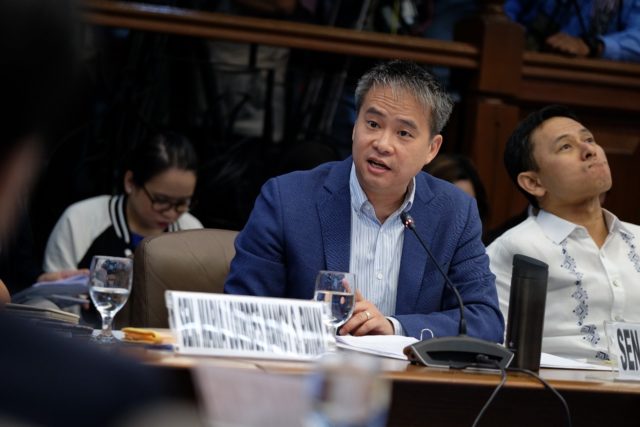Senator Joel Villanueva expressed disappointment over the failure of PhilHealth officials to offer substantial answers on issues he raised at the Senate Committee of the Whole inquiry into the allegations of corruption surrounding the state health insurance agency.
The evasiveness of PhilHealth officials to answer simple questions, such as the average hospital bill of COVID-19 patients or the rationale over the insistence of certain board members to endorse a P750-million budget despite a pending audit or inventory of the ICT equipment of the corporation, is worrisome to say the least, according to Villanueva, who attended the committee meeting at the Senate session hall on Tuesday morning.
“Hindi po nila nasagot yung mga tanong natin kanina, kahit po ang average hospital bill ng mga kumpirmado at posibleng pasyente na may COVID-19 na hinihingi natin, para makita natin kung sapat ba ang PhilHealth case rates para sa mga COVID-19 patients. Naglalaro po tuloy sa isipan natin na parang ayaw nila sagutin ang tanong para hindi masabi na maliit ang benefit value ng PhilHealth,” Villanueva said in a statement. “Taliwas po ito sa diwa ng ating Universal Health Care (UHC) law.”
The UHC law, which mandated increased premiums to support more and increased benefit packages, should have eased the burden of members in shelling out cash to cover healthcare expenses, the lawmaker explained.
Citing PhilHealth data, Villanueva pointed out that even prior to the COVID-19 pandemic, the state health insurer has been recording persistently low support value, or the portion of hospitalization costs that the agency shoulders vis-a-vis the members’ total hospital bill, despite the increased funds of PhilHealth from premium payments of direct contributors and the annual appropriations in the national budget to finance the implementation of the UHC Law.
From as high as 59 percent of support value in 2014, the rate decreased steadily every year after. In the first six months of 2019, PhilHealth support value was at mere 41 percent, according to the agency data.
Villanueva also questioned why the agency’s P750-million budget for information and communications technology program was endorsed for approval of the PhilHealth board, despite the pending completion of an internal audit report on its ICT capability, and despite having previously approved a P327-million budget for ICT.
He likewise raised a concern over the supposed favoritism of the agency in granting cash advances to hospitals in regions where there was a low or no COVID-19 cases at all. There were also releases to facilities not designated as COVID-referral centers.
“Mukha pong may tinatago sa hindi nila pagbigay ng maayos at klarong sagot sa mga tanong tungkol sa detalye ng P750 million na ICT budget na pinapa-aprubahan sa Board, at ang implementasyon ng kanilang reimbursement mechanism. Sa aming obserbasyon, malinaw na may interes na gustong isulong ang ibang PhilHealth employees sa madaliang pag-endorso ng P750 million ICT budget kahit na hindi pa lumalabas ang internal audit report na naglalayong magbusisi kung ang mga items at presyo na kasama sa budget ay may kaukulang basis,” Villanueva said.
“Maliban dito, may mga pinaboran rin na mga ospital na nabigyan ng cash advance sa mga lugar na wala o may mababang bilang ng kaso ng COVID-19. Sa estado ng mga nalaman natin sa PhilHealth, mas lalo pa nitong pinagtibay ang hinala natin na may mafia sa loob ng ahensya,” he added.





